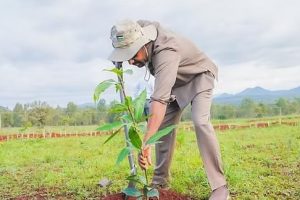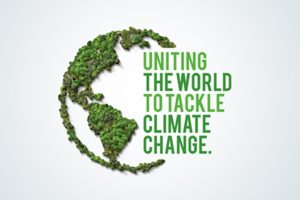Fifty years have elapsed since the world declared environmental issue, a global multilateral agenda at the first conference on environment in Stockholm in 1972. Now, the world is preparing to organize the “Stockholm +50” event on the coming July to commemorate the Golden Jubilee of the first environmental conference.
The Stockholm +50 is an event scheduled to be held on 2 and 3 June 2022 in Stockholm, Sweden to commemorate the 50 years of global environmental actions that aimed to accelerate the global environmental actions by promoting multilateralism and joint actions.
The first conference on environment by the United Nations was held in 1972 in Stockholm, Sweden, that makes the environment sector a major global issue. Following the Stockholm Conference on Environment, the participants adopted several resolutions and principles to act on environment including the Stockholm Declaration and Action Plan for the Human Environment.
The creation of United Nations Environment Program (UNEP) was also a result of the Stockholm conference and the Stockholm Declaration has contained 26 principles that placed environmental issues at the forefront of the international agendas. This declaration helped to start dialogues between industrialized and developing countries on the link between economic growth, air pollution, and the well-being of people around the world.
To commemorate the global environmental actions during the past 50 years and to accelerate the global actions in the sector, 50 + Stockholm conference on environment would be organized in Stockholm on July 2022. This international environmental meeting, anchored in the UN’s Decade of Action, is a crucial event to accelerate global efforts and actions on the environment and climate sector.
Recently a national discussion was organized in Ethiopia entitled “Concept Note for Stockholm + 50 National Consultations” prepared by Ethiopian Environment Authority with partners. A document prepared for discussion at the event stated that the Stockholm +50 aims to accelerate the implementations of the UN Decade of Action to deliver the Sustainable Development Goals, the Agenda 2030, Paris Agreement on Climate Change, the post-2020 global Biodiversity Framework and encouraging the adoption of green post-COVID-19 recovery plan.
According to the document, the event aims at promoting multilateralism in tackling the earth’s triple planetary crisis- climate, nature and pollution. In addition, the conference also eyes on raising awareness about the importance of protecting the planet and sets a path to overcome the triple planetary crisis of climate change, nature and biodiversity losses, and pollution and waste.
Before the international event in Stockholm, the Stockholm +50 is conducting national consultations within 58 countries between February and May 2022. Ethiopia is one of the 58 countries selected for the national consultation and held its first national consultation last week. The goal of these national consultations is to inform the international meeting through national reports and a global synthesis report that captures key findings, recommendations, data, media coverage, and links national policy frameworks, according to a document prepared for the discussion.
In addition, the national consultations target building a shared global vision to achieve a healthy planet, prosperity, accelerate progress on the SDGs and multilateral environmental agreements through an inclusive green recovery. It also amplifies the voices of the poor and other marginalized groups.
During the national consultation a young Environmental Activist, Yared Abera presented a paper entitled “Meaningful youth engagement on environmental governance.” As a young activist struggling to see healthy environment, The Ethiopian Herald approached Yared to discuss the achievements and limitations of the past 50 year’s global multilateral responses on environment and on what to do in next global multilateral actions.
Yared stated that the 1972’s first UN conference on environment helped the world to establish environmental based institutions and makes the environment and climate change a global agenda. Almost all international and national institutions on climate change and environment are the products of the Stockholm conference; Yared said adding this is the major achievement of the past 50 years.
Following the establishment of these environmental institutions including the United Nations Environment Program (UNEP) and other global, regional and national institutions, different environmental programs were implemented globally and nationally. “The Millennium Development Goals and the current Sustainable Development Goals are the products of these international environmental institutions and progresses and developments in multilateral environmental global actions are increasing from time to time,” Yared added.
The international initiatives, agreements and responses on climate change and environment are the outcomes of the international multilateral discussions and conferences. The Copenhagen and Paris conferences and the agreements adopted following the conferences are also among the achievements of global multilateralism in the environment sector. In addition, the UN institution, UNEP that established following the Stockholm Conference is organizing a universal regular conference on environment every two year that mobilizes the world community to act on environment and climate change.
According to Yared, the initiation of multilateralism in the environment sector also creates a discussion platform between developing and developed countries. Following this platform, financial flow from the developed world started to support the efforts of the developing world on environment actions and to build climate resilient world, though there are practical limitations. The global financial flow in the environment sector is the outcome of the establishment of multilateralism in the sector, he noted.
During the past 50 years of multilateralism responses in the environment sector, Yared identified that limited financial allocation to the sector and financial shortages, unpractical promises in the finance sector, in accessibility or high bureaucracy in the financial sector for developing countries even after it allocated since the finance is deposited in global institutions and loose trust between developing and developed countries are among the limitations. Hence, Yared stated that during the Stockholm + 50 conference, the world is expected to apply practicable mechanisms in solving the past limitations.
Globally, the conference would accelerate the UN decade of action to deliver the Sustainable Development Goals by 2030 by solving the limitations, Yared stated. In addition, it would also boost the global financial flow and ease the system for developing countries to increase the global actions in the sector. Similarly, a mechanism must also be applied to build trust between the developing and developed world and legal mechanism must also be created to make the promises practicable.
Nationally, Ethiopia is among the top participants and contributors of the multilateral responses and agreements on the environment sector since the early period. Ethiopia’s participation in the environmental diplomacy is satisfactory and its voices at global level are sounding, Yared said. For him, the national responses in institutionalizing the sector, policy and strategy preparation and implementations brings practical outcomes.
“The Climate Resilient Green Economy of the country’s strategy is a sounding response,” Yared underlined adding countries take lessons from Ethiopia’s climate resilient green strategy. Many countries’ Nationally Determined Contributions (NDCs) take lessons from Ethiopia’s strategy. In addition, the Red Plus project and the current green legacy initiative of the country are practical actions that helps in ecosystem restoration and tackling climate change.
Ethiopia also mobilizes Africa in this regard. This indicates that Ethiopia’s role in promoting the development of multilateral environmental action is crucial. Hence, For Yared, Ethiopia should strengthen its efforts in contributing its role for the development of multilateral diplomacy in the sector in the coming 50 years.
During the Stockholm +50 national consultation Ethiopia announced that it identifies national and sector based thematic areas. Nature based solution for reducing vulnerability, ensuring food security and building resilience, environmental pollution and Ethiopia’s response, policies, institutions, legal frameworks supporting environmental sustainability in Ethiopia and knowledge management and communication are the top thematic areas of the national consultation where the second consultation is expected to be organized on May 2022.
BY DARGIE KAHSAY
THE ETHIOPIAN HERALD TUESDAY 19 APRIL 2022





